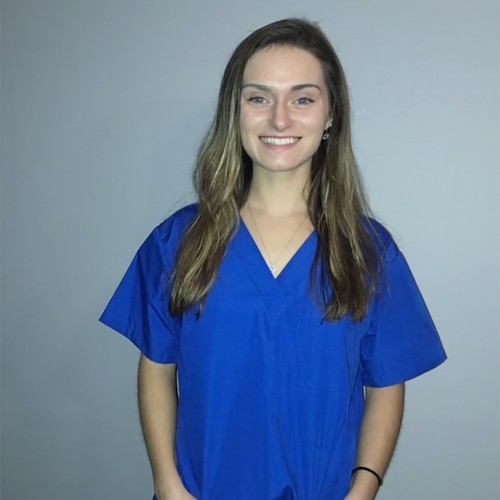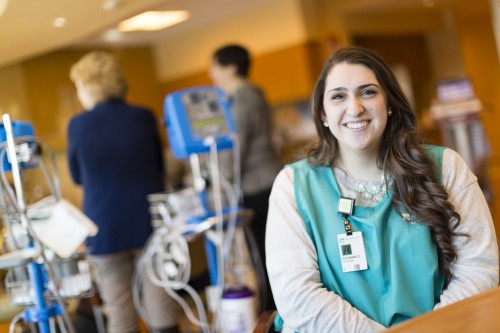Bringing Compassion to Health Science
In the course of preparing students for careers as nurses, physician assistants and physical therapists, faculty impress upon them the importance of equal access and humanity.
Health Science Program Emphasizes Field Experience and Compassion
Adriana Solari ’20 began her Stonehill years with visions of a career doing bench research. But as she completed the prerequisites for her chosen major of biochemistry, the time she spent in the laboratory left her wanting something more.
“I had taken medical assistant classes in high school and missed the aspect of working as part of a multidisciplinary clinical team,” says Solari, an Attleboro, Massachusetts, resident. “I hadn’t realized how important that human element was to me.” The opportunity to work with people in a clinical role is at the heart of Stonehill’s health science major, established in 2016. Steeped in rigorous courses that provide a foundation in the natural and social sciences, the program is designed to prepare students for success in a wide range of allied health careers.
“In building the program, we looked at prerequisite courses across graduate training programs — including nursing, physician assistant and physical therapy — and incorporated the ones with the greatest commonality, alongside experiential learning through clinical internships,” says Professor Kate Harris, program director. “We then rounded out those courses with electives focused on a greater understanding of human health, such as endocrinology, neuroscience or health psychology, so students can tailor their learning to their desired career pathway.”
It was the variety of experience in this cross-disciplinary approach that Solari appreciated most.
“Stonehill’s health science major offers flexibility that others do not,” she says. “I was able to get out of the strict ‘track’ mindset and realize that I could follow my own path.”
Solari’s two internships also allowed her to accumulate training hours toward certified nursing assistant certification, a mark of professionalism that differentiates her as she applies to direct-entry nurse practitioner programs in the Boston area.
Stonehill Class of 2020 students Gayle Regis, left, Paige Barnard, center, and Madison Raposa present their research at the 2019 American Public Health Association annual meeting in Philadelphia.
Professors Who Work in the Field Guide Students’ Pathways
Anchoring this relatively new program is the strong faculty support that is Stonehill’s trademark, with health science majors closely advised by faculty with extensive experience on the front lines of their fields — from clinical epidemiology to nutrition.
Giulia Ensing ’19 says a mentoring relationship with Professor Tracy R. Rosebrock is what helped her discover her passion for public health.
“The most defining moments at Stonehill were my relationships with the professors in the health science major,” says Ensing, who is now in the Netherlands pursuing a research master’s in global health at Vrije Universiteit Amsterdam. “They are truly dedicated to the students and encourage exploration.”
The program’s internship requirement is another feature that students frequently cite as a key to helping them refine their intent, notes Harris. “They may have one focused direction and then experience the clinical realities of that particular setting and come to understand it’s not for them at all — which saves them from pursuing graduate education in a field that may not be a fit,” she says. “The experiential learning aspect of our program allows students to home in on the field where they truly want to make a contribution.”
Madison Raposa ’20 originally thought she wanted to work in a surgical unit, but an internship with the Loddenkemper Research Lab at Boston Children’s Hospital piqued her interest in research as she supported clinical trials in pediatric epilepsy there. “Stonehill’s emphasis on experiential learning allows students to experience a variety of real-world settings, so you can determine what you truly enjoy — and for me, that was life-changing,” she says.
Health Education Emphasizing Heart and Mind
In addition to an emphasis on mentoring and experiential learning, graduates of Stonehill’s Health Science Program are also provided with opportunities to develop leadership skills that often serve them throughout their careers.
Ensing points to experiences in which she was able to mentor younger students and other experiences in which she had the opportunity to network with alumni and other professionals in the health science field. “These two components allowed me to develop my leadership skills, as I both encouraged others to explore and treaded some unfamiliar territory,” she says.
Harris says she hopes such experiences equip graduates to be leaders in advancing science but also in another area central to Stonehill’s values: social justice. “The recognition and grappling with the consequences of documented disparities in our health care system is addressed in our curriculum,” says Harris. “Our students develop a solid foundation in the sciences, but they also understand and accept all others’ humanity, which is highly relevant to success in health care careers.
“Health care is complex and will require further professional training in graduate school, but making an effort to understand how people’s backgrounds relate to their current state of health is simple. Compassion — whether directed toward an individual recovering from a surgery or in researching an emergent infection in order to strengthen population resistance — is a skill, and if we can communicate that to our students, they will be more effective in their future work.”
Stonehill’s health science major offers flexibility that others do not. I was able to get out of the strict ‘track’ mindset and realize that I could follow my own path.
Related Stories
-

Stonehill’s new minor provides distinct advantages to students pursuing careers in communication science disorders, speech-language pathology, and audiology.
-

Students interested in health science find Stonehill’s emphasis on internships, research, liberal arts and advising gives them a distinct advantage in this competitive field.


